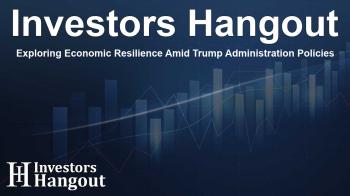Exploring Economic Resilience Amid Trump Administration Policies

Understanding Economic Resilience Under New Policies
The current state of the US economy shows stability, but looming pressures from White House policies could challenge its resilience in the coming months.
Since the inauguration of President Trump, there has been a wave of changes impacting the economy. These transformations have created considerable uncertainty, ranging from the introduction of tariffs to various shifting regulations. The recent trade deal discussions, including those with Japan, remain uncertain, contributing to the overall unpredictability surrounding US-China trade relations.
Higher tariffs are projected to potentially reduce the federal deficit by up to $4 trillion over the next decade, yet this comes at a cost. Increased tariffs could lead to a rise in inflation, adversely affecting economic growth.
The Trump administration also seeks to extend its influence over different sectors of the economy. Recently, Commerce Secretary Howard Lutnick announced that the government acquired a 10% stake in the chip manufacturing giant Intel to sway private sector decision-making. Economic advisor Kevin Hassett mentioned the likelihood of further transactions across various industries.
In a surprising turn of events, President Trump dismissed Federal Reserve Governor Lisa Cook, raising eyebrows with the claim that she made false statements regarding home mortgage applications. Cook's intention to resist resignation and pursue legal action adds another layer of complexity and uncertainty to economic governance.
Lev Menand, a professor of law, remarked, “This is unprecedented...if this removal sticks, it could endanger the independence of the central bank in the US.”
Trump's unique approach to economic policies might be setting in motion a series of changes that challenge the existing economic framework. Whether you support or oppose these policies, it's evident that the administration's agenda poses unprecedented challenges that we have yet to fully comprehend.
The economy currently stands at a precarious moment, with signals of slowing growth and rising inflation. A recently published Chicago Fed National Activity Index revealed weak economic activity for consecutive months, with key indicators showing negative contributions to overall performance.
Andy Challenger, a senior vice president at an outplacement firm, indicated that a cooling labor market is a significant factor at play. Companies are reportedly preparing for potential layoffs, heightening concerns about economic stability.
“We’re noticing a substantial cooling in the labor market. Many companies are communicating future layoffs,” Challenger noted.
Alongside these challenges, inflation rates are starting to pick up speed. The Core CPI, which excludes volatile food and energy prices, grew by 3.1% annually, marking the fastest pace in several months and surpassing the Federal Reserve’s 2% inflation target.
Despite some indicators still reflecting a steady growth trajectory, such as the Dallas Fed’s Weekly Economic Index, the unresolved issues surrounding tariffs and regulatory changes indicate rising potential for economic turbulence. Consequently, the US economy is navigating unchartered territories.
This phase appears to be an unprecedented experiment that will test both the resilience of economic growth and the tolerance of financial markets. So far, the economy has experienced some minor disruptions, but significant hurdles may lie ahead.
Some analysts contend that we may already be close to a tipping point. Barclays analysts believe the economy has entered a “stall state,” where the growth rate may have slowed enough to increase the risk of a recession.
While this forecast remains contested by broader economic data trends, the approaching weeks will serve as a critical test of resilience. Investors and economists alike will keep a close eye on various indicators, including the Dallas Fed’s Weekly Economic Indicator and the Atlanta Fed's GDPNow model, for timely insights into economic progression.
As they stand, these indicators still signal positive growth; however, with mounting pressures, signs of potential difficulties may soon arise.
Frequently Asked Questions
What recent policies have impacted the US economy?
Recent policies under the Trump administration, such as tariffs and government stakes in private companies, have significantly influenced economic dynamics and added uncertainty.
How have tariffs affected inflation rates?
Higher tariffs may lead to increased prices, contributing to inflation and potentially slowing economic growth.
What is the current state of the labor market?
The labor market shows signs of cooling, with an increase in discussions around potential layoffs among various companies.
What does the Core CPI indicate about inflation?
The Core CPI measures inflation by excluding food and energy. Recently, it escalated to 3.1%, exceeding the Federal Reserve's target of 2%.
What key economic indicators should we monitor?
Key indicators include the Dallas Fed’s Weekly Economic Indicator and the Atlanta Fed’s GDPNow model, both of which provide insights into ongoing economic performance.
About The Author
Contact Henry Turner privately here. Or send an email with ATTN: Henry Turner as the subject to contact@investorshangout.com.
About Investors Hangout
Investors Hangout is a leading online stock forum for financial discussion and learning, offering a wide range of free tools and resources. It draws in traders of all levels, who exchange market knowledge, investigate trading tactics, and keep an eye on industry developments in real time. Featuring financial articles, stock message boards, quotes, charts, company profiles, and live news updates. Through cooperative learning and a wealth of informational resources, it helps users from novices creating their first portfolios to experts honing their techniques. Join Investors Hangout today: https://investorshangout.com/
The content of this article is based on factual, publicly available information and does not represent legal, financial, or investment advice. Investors Hangout does not offer financial advice, and the author is not a licensed financial advisor. Consult a qualified advisor before making any financial or investment decisions based on this article. This article should not be considered advice to purchase, sell, or hold any securities or other investments. If any of the material provided here is inaccurate, please contact us for corrections.

